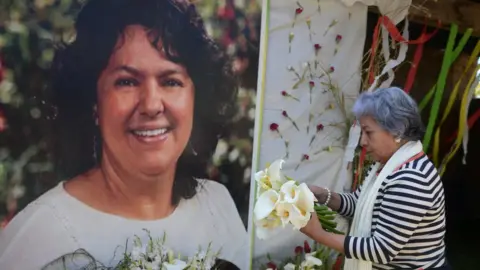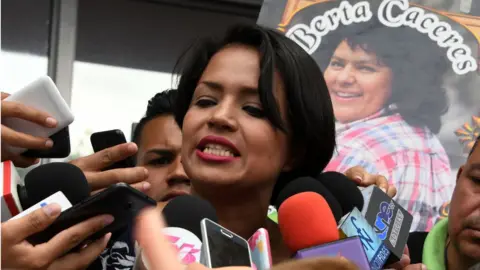Berta Cáceres murder: 50 years in jail for activist's killers
 Getty Images
Getty ImagesSeven men found guilty over the killing of environmental activist Berta Cáceres in Honduras in 2016 have been sentenced to lengthy jail terms.
Berta Cáceres was shot dead by gunmen in her home.
She had received death threats after successfully pressuring the builders of a hydro-electric dam to halt their project.
The dam would have flooded large areas of land inhabited by the indigenous Lenca people.
Who was sentenced?
Four men, who were identified as the hitmen hired to shoot Ms Cáceres dead, were sentenced to 34 years in prison each.
They were also sentenced to another 16 years and four months for the attempted murder of Mexican environmentalist Gustavo Castro, who was with Ms Cáceres at the time of the attack but survived.
Two men who had links to the company building the dam, Desa, were sentenced to 30 years for helping organise the killing. A former Honduran army major was also given 30 years.
They all have 20 days to appeal against the sentence.
Who was Berta Cáceres?
Ms Cáceres was a member of the Lenca indigenous community.
She was the co-founder of the Civic Council of Popular and Indigenous Organizations of Honduras, an organisation fighting for the rights of indigenous people and trying to draw attention to the dangers facing them by increasing illegal logging and mining concessions.
In 2015 she came to international attention when she was awarded the Goldman environmental prize for her role in stopping the building of the Agua Zarca dam.
The dam would have flooded large areas of land and cut off the supply of water, food and medicine for hundreds of Lenca people.
 Getty Images
Getty ImagesAs well as filing complaints with the authorities, she organised a road block successfully preventing construction workers from reaching the site.
Eventually, the Chinese state-owned company Sinohydro who was jointly developing the project with Honduran company Desarrollos Energéticos SA (Desa), pulled out citing community resistance.
What has been the reaction?
Ms Cáceres' daughter, Olivia Zúniga, said that the people who had ordered her mother's killing had not yet been punished.
"This is a day of pain because the intellectual authors of my mother's murder are still enjoying impunity," she said. "We are not going to believe that there's true justice until these people are in jail."
The former executive president of Desa, Roberto Castillo, was indicted in March for allegedly having co-ordinated Ms Cáceres' murder and paying the hitmen. He has denied any involvement.
